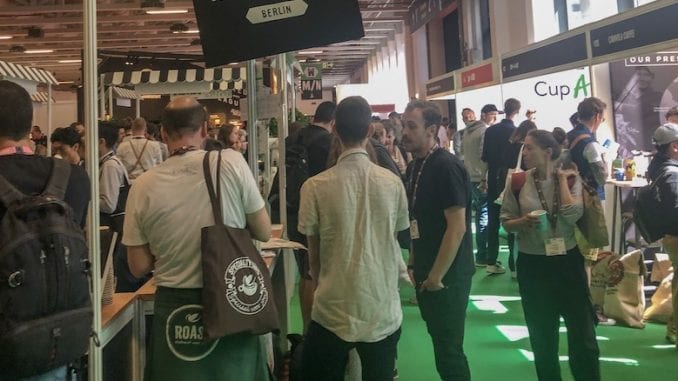
Checking out the wide variety of coffee roasters exhibiting at Europe’s biggest specialty-coffee show.
BY CAROLINE CORMIER
SPECIAL TO BARISTA MAGAZINE ONLINE
Photos by Caroline Cormier
Last week, thousands of coffee professionals from around the world converged on Berlin for the 2019 World of Coffee event. Barista Magazine Online was on-hand to take in some of the happenings on the show floor and at the coffee competitions. Check out our first installment of show coverage here and the second part here; read on for the third and final piece.
This year’s World of Coffee in Berlin featured two areas of the Roaster Village, with 70 roasters from around the world. Bustling with coffee enthusiasts all three days, the Villages offered visitors the opportunity to discover the latest trends in coffee sourcing, roasting, and brewing. Not to mention, the chance to try hundreds of different coffees from around the world!
Here, we profile a few of the roasters we had a chance to meet and chat with on the floor.
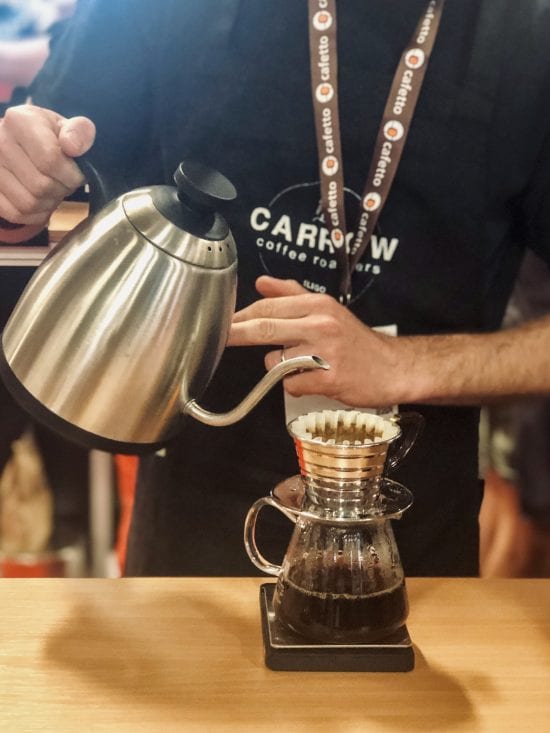
Carrow Coffee Roasters is a small roastery owned and operated by Andrew Willis and his wife, Paola, on a sheep farm in rural Ireland. Over a cup of their El Pensamiento roast from Guatemala at their booth, Andrew explained their strategy for sourcing beans: “Since my wife and I are farmers ourselves, we have empathy for the many difficulties that small farmers face. That’s why we make a big effort to source beans grown in a sustainable way and to support small-scale producers.” The El Pensamiento micro-lot comes from the roughly 300 trees grown by Filomeno Rodriguez López’s farm in Guatemala’s Huehuetenango region near the Mexican border, and has delicious notes of rum and raisin, as well as the usual hints of dark chocolate often found in this terroir.
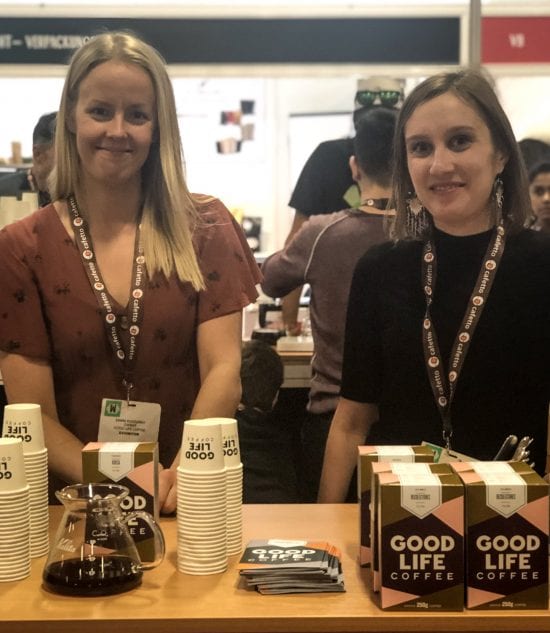
This was the first time that Good Life Coffee from Helsinki attended World of Coffee. Owner Sanni Kuusijarvi, and her colleague Silja Löfgren were offering two filtered coffees, Recolectores from Columbia and Ichesa from Tanzania, for passers-by to try. According to Sanni, their company’s goal is to make coffee as accessible as possible. She explained, “Our idea of good coffee is simple: carefully selected high-grade beans combined with precise procedures and a no –bullsh*t take on roasting and brewing.”
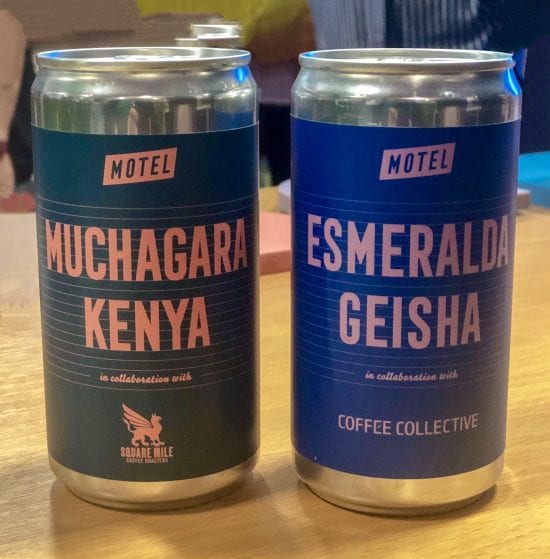
Motel Minibar, led by a team of four entrepreneurs who hail from all corners of the world, first set up shop in Berlin just five years ago. Their coffee is flash-brewed to extract its natural sweetness, and canned with liquid nitrogen to keep it fresh, creamy, and delicious. They brought samples of their ready-to-drink coffee—including their regular Nitro Coffee and Nitro Flat White made with oat milk—to World of Coffee for visitors to try.
They also brought along two limited-edition drinks crafted especially for this year’s World of Coffee. The first was in collaboration with The Coffee Collective and features the Esmeralda Gesha, which is a coffee with intense, fresh, and floral aromas of jasmine and bergamot, and with a honey sweetness, lively acidity, and mild creamy mouthfeel. The second was the Muchagara Kenya, a collaboration with Square Mile Coffee Roasters. This Kenyan coffee has unique flavors of milk chocolate and oaky red wine.
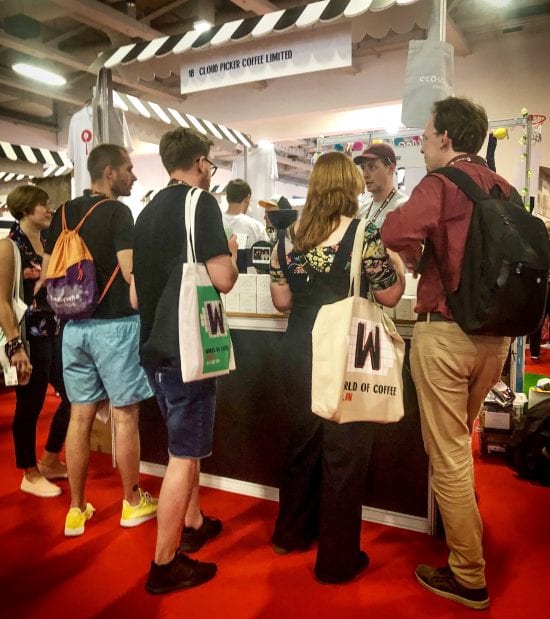
In operation since 2013, Cloud Picker Coffee is a micro-roastery based in Dublin that roasts specialty coffee from all over the world and supplies cafés and restaurants across Ireland. The roastery, which is known for its award-winning packaging, got its name from a trip the co-owners, Frank Kavanagh and Peter Sztal, took to Northern Thailand years ago. They visited a coffee farm in the Doi Chaang area on the Thailand/Myanmar border, where they went up through the clouds to see the coffee pickers.
Frank and Peter continue to visit coffee farms around the world, particularly those they source from. One of the coffees they were offering visitors at World of Coffee was the Fazenda Passeio from Sul de Minas, Brazil—a farm that has been owned and operated by the same family for four generations.
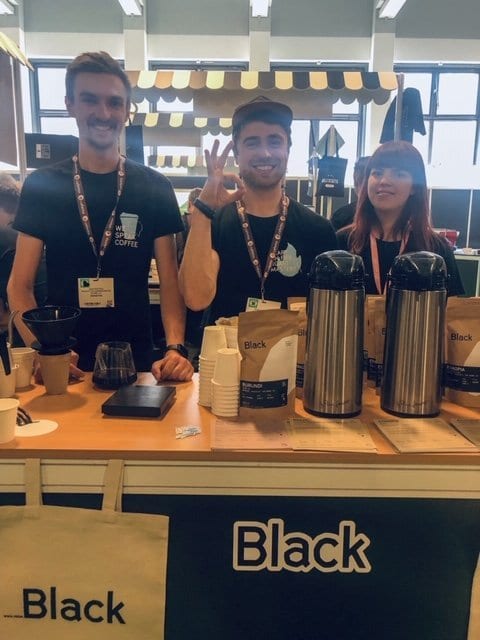
Another exhibitor in the Roaster Village, Black, is the largest specialty coffee roaster in Ukraine, located in the capital city of Kyiv. With eight years in the coffee business, a café, and a coffee school, Black and its 60+ member team continue to grow. At the Roaster Village, their team was serving up several different African coffees, including the Musha Natural from Rwanda, a coffee they described as having a juicy body with hints of black currant, sweet grapefruit, and marzipan.
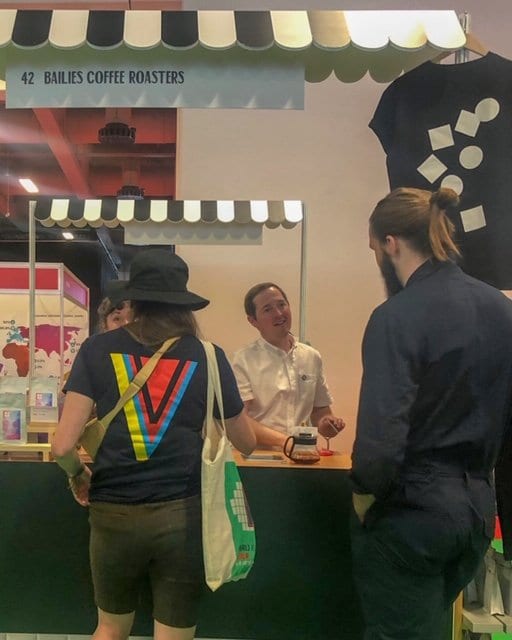
Andrew Hollywood, head of sales and marketing at Bailies Coffee Roasters, chatted to visitors at their booth about how the Belfast, Ireland-based roastery sources their coffee through ethical, sustainable, and long-term relationships with some of the world’s finest coffee farmers. A quick poll of the staff who were on hand indicated that their favorite coffee at the moment is the Costa Rican La Ortiga. Used in this year’s World Brewers Cup Championship by head roaster Stephen Houston, this extremely limited-edition roast is known for its intriguing cup, with tasting notes of cinnamon and caramelized pear.
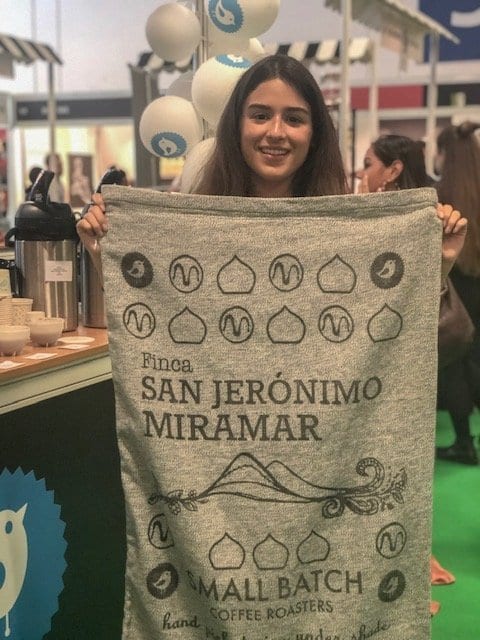
A love and passion for coffee has been central to Alexandra Dalton’s family for six generations. Alexandra’s family is behind Coffee Bird, and they know all too well that there’s no place like home. Their family farm, Finca Filadelfia, is made up of three different areas including Monte de Maria, Bosques de San Francisco, and Filadelfia. This farm is where Alexandra’s great-great-great grandfather pioneered coffee farming in Antigua, Guatemala, and it is with deep appreciation and honor that the family continues his tradition. Working with their own family farm keeps Coffee Bird connected to farm life and helps foster strong relationships and a sense of community with the other farmers with which the London-based roastery and café partners.
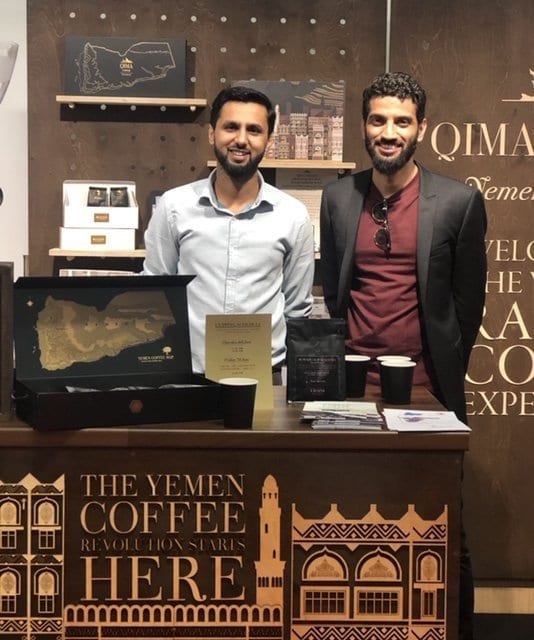
Yemeni coffee roasted in London by Qima Coffee was a delight for visitors to try. Founded in 2016, Qima Coffee is Yemen’s first accredited specialty coffee producer and the country’s only fully integrated specialty coffee exporter. Faris Sheibani, the founder and CEO of Qima, says that the London-based roastery works in direct partnership with smallholder farmers across Central and Northern Yemen, ensuring that even “super smallholder” farmers—e.g., those who produce nano- and pico-lots as small as 2 kg per farmer—are able to turn a profit on their coffee. Dealing with such small batches, Qima’s coffees can be sourced back to the farmer who grew them, and this information is shared with customers to ensure the highest levels of transparency.
That’s it for World of Coffee 2019 in Berlin! It was an action-packed show full of exciting booths, competitions, and more, and we’re already looking forward to next year’s show in Warsaw, Poland!
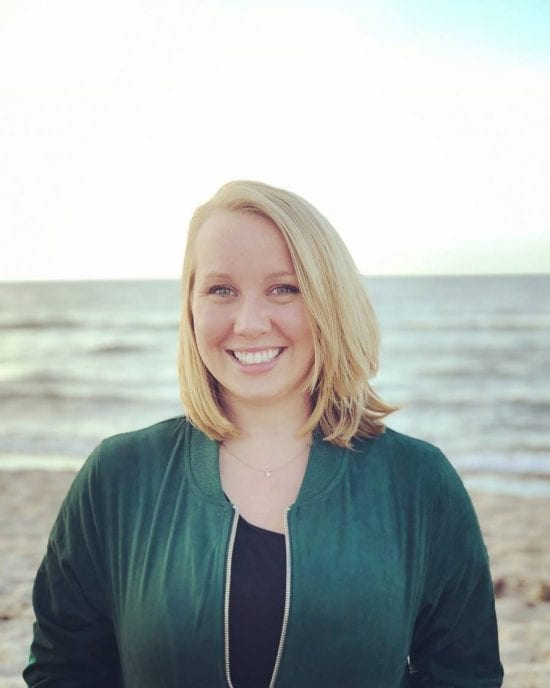
ABOUT THE AUTHOR
Caroline Cormier is a freelance writer from Canada. She currently lives in Berlin, where you can find her digging through archives to discover forgotten stories of the past for her Ph.D., exploring the city’s art and culture scene, or simply enjoying a good cup of coffee at a local café or farmers market.


